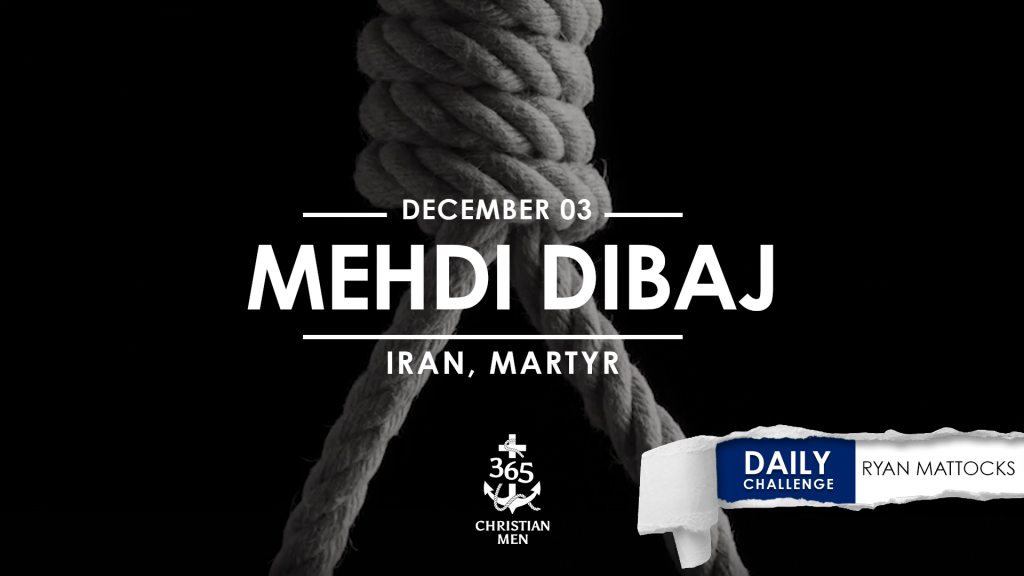December 3. Mehdi Dibaj. Dibaj had become a Christian. He said, “A Christian means one who belongs to Jesus Christ. The eternal God, who sees the end from the beginning and who has chosen me to belong to Him, knew from everlasting whose heart would be drawn to Him … I would rather have the whole world against me, but know the Almighty God is with me; be called an apostate, but know I have the approval of the God of glory.”
On this date in 1993, an Islamic Revolutionary Court sentenced Dibaj to death. His crime—he had become a Christian. Here’s how it happened.
Know what you’ll die for, and you’ll know what to live for.
The Iranian prison authorities thrust a paper before Dibaj. If he would sign it and declare himself a good Muslim, he could go home to his family. When that didn’t work, Dibaj’s captors tortured him and performed mock executions, pressuring him to deny Jesus.
Meanwhile they threatened his wife Azizeh with stoning. Eventually they broke her. Turning from her faith, her marriage vows, and their four children, Azizeh agreed to marry a “proper” Muslim.
Years passed. Even in prison, Mehdi shared his faith, and the hearers followed Jesus. Frustrated, the authorities sent him, unsupervised, for dental work outside of the prison, hoping Mehdi would flee. But he returned at the appointed time.
When Mehdi was shoved into a nine-square-foot unlit cell, solitary confinement seemed like suffering the fate of hell. But then Mehdi sensed God’s closeness. At first, he had structured prayer times, but eventually he realized God kept him company minute by minute.
Mehdi received two death sentences. Each time he appealed on technicalities. On December 3, 1993, after two years in solitary confinement and almost a decade in prison, the Islamic Revolutionary Tribunal of Sari issued Mehdi’s third—and last—death sentence. This time he planned a different response.
When his son visited, Mehdi sent a note with him to their Christian friends. “When they gave me the verdict, my heart was filled with joy because I saw that my name would be listed with those martyred for their faith in Jesus Christ.”
“For to me to live is Christ, and to die is gain” (Philippians 1:21 ESV).
Mehdi requested a few simple things, including a last Communion and to wear the cross when he was executed.
Then, instead of a legal defense, he wrote a bold statement of faith: “The invisible God who knows our hearts has given assurance to us, as Christians, that we are not among the apostates who will perish but among the believers who will have eternal life. … People say, ‘You were a Muslim from your birth.’ God says, ‘You were a Christian from the beginning.’ … They tell me, ‘Return!’ But to whom can I return from the arms of my God? … They object to my evangelizing. But if one finds a blind person who is about to fall in a well and keeps silent, then one has sinned.… I have committed my life into His hands. Life for me is an opportunity to serve Him, and death is a better opportunity to be with Christ. Therefore, I am not only satisfied to be in prison for the honor of His Holy Name, but am ready to give my life for the sake of Jesus, my Lord, and enter His kingdom sooner, the place where the elect of God enter everlasting life.”
Friends leaked Mehdi’s story outside of Iran, and the world responded with public outrage. The death sentence was never reversed, but due to the pressure, Mehdi was released on January 16th. For six months Mehdi traveled Iran, encouraging believers, who said, the “light and love of Christ just shone from his face.”
In April, a fatwa—a pronouncement based on religious authority—was issued in a Tehran newspaper calling for Mehdi’s death. On June 24th Mehdi Dibaj disappeared. His body—tortured and murdered—was found in a Tehran park on July 5th. Three Iranian Christians were martyred that year. Since then more than a million Iranians have chosen faith in Jesus.
What are you willing to die for? Know what you’ll die for, and you’ll know what to live for.
Based on an interview with Abe Ghaffari of Iran Christians International in Colorado Springs, CO, USA, 2018. http://www.iranchristians.org/.
Fickett, Harold. “Three Pastors: Life, Death and Religion in Muslim Iran.” January 1, 2007. https://www.crisismagazine.com/2007/three-pastors-life-death-and-religion-in-muslim-iran.
Dibaj, Rev. Mehdi. “The Written Defense of the Rev. Mehdi Dibaj Delivered to the Sari Court of Justice.” December 3, 1993. http://farsinet.com/persecuted/dibaj.html.
Story read by Peter R Warren, https://www.peterwarrenministries.com/





